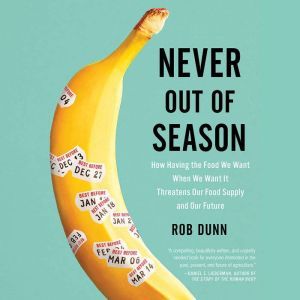Quotes
Praise for Never Out of Season
"Once again Rob Dunn shows how relevant knowledge of natural history and ecology is to the environment and to the details of our personal lives."—Edward O. Wilson, University Professor Emeritus, Harvard University
"This is a compelling, beautifully written and urgently needed book for everyone interested in the past, present and future of agriculture. By weaving together science, history and biography, Dunn will transform how you think about sustainability in an increasingly complex and precarious world in which we rely on just a few industrial crops to feed more than seven billion people."—Daniel E. Lieberman, author of The Story of the Human Body
"Part cautionary tale and part call to arms, Rob Dunn's new book vividly exposes the vulnerability of our most important crops. An alarming and illuminating read."—Thor Hanson, author of The Triumph of Seeds
"Rob Dunn is master story-teller with an insatiable curiosity, an old soul, and an absolute love of science and history. In 'Never out of Season' Rob combines these qualities with his deep knowledge of natural history, evolutionary biology and human behavior. The result is a book that is both of profound importance, and impossible to put down."—Josh Tewksbury, Future Earth Research Professor, University of Colorado
"Never Out of Season is an extraordinary achievement. In it, Dunn tells the story of the most important of all human endeavors from the perspective of an ecologist. He celebrates our successes and draws lessons from our follies with equal parts humor and wit."—Colin Khoury, International Center for Tropical Agriculture
"Nature is threatened, by our simplification of the Earth. But, as Dunn makes clear in this soon to be classic page turner of a book, this simplification of nature makes us ever more rather than less dependent on nature. This is a lesson we need to heed now at a time in which our bananas, but also our wheat, our cassava and even the rubber in our tires is threatened like never before. Everyone who eats should read Never Out of Season."—Paul R. Ehrlich, author of Human Natures
"Forget about cooking books. This is the most important book you will read about food this year. Every single page has surprising facts and insights. The health of the planet depends on us eating more plants. But the monoculture of our foods that dominates global crops could have disastrous effects if we don't begin to think differently. Never Out of Season will change forever the way you look at a potato, a banana, or your chocolate bar."—Peter C. Kjærgaard, Museum Director and Professor of Evolutionary History, Natural History Museum of Denmark
"Over the last decade, Rob Dunn has emerged as the most refreshing and exciting interpreter of the natural sciences on the planet, bringing nature writing into fresh territory with wonder, humor and verve. In Never Out of Season, he suggests that whether or not we embrace or disgrace the diversity and seasonality of foods on this planet can ultimately make or break our food system and our life support system as a whole. He does so not with the rhetorical polemics of a strident foodie, but with a storyteller's sense of what can move our minds, hearts and palates to embrace place-based and seasonally-in-step diets that will enrich our senses without depleting the earth's bounty. Rob's capacity to open our minds and senses to other possibilities makes him my favorite literary naturalist; let him become yours, and you will not regret it."—Gary P. Nabhan, agricultural ecologist, author, and recipient of the Vavilov Medal
"Engrossing... [Dunn] mediates on the humility with which his colleagues and forebears have preserved the planet's botany... shows how we have been spared catastrophe by legions of unsung heroes and heroines working across a range of crops, from cassava to cocoa to rubber to wheat."—Raj Patel, New York Times
"A convincing argument that the agricultural revolution that has made food more readily available around the world contains the seeds of its own destruction.... An alarming account but one suggesting that, armed with knowledge, we can reverse this way of treating the plants that feed us and find a way toward a more sustainable diet."—Kirkus


![]()


